Interview with Zehra Patwa of the Connecticut Coalition to End FGM/C
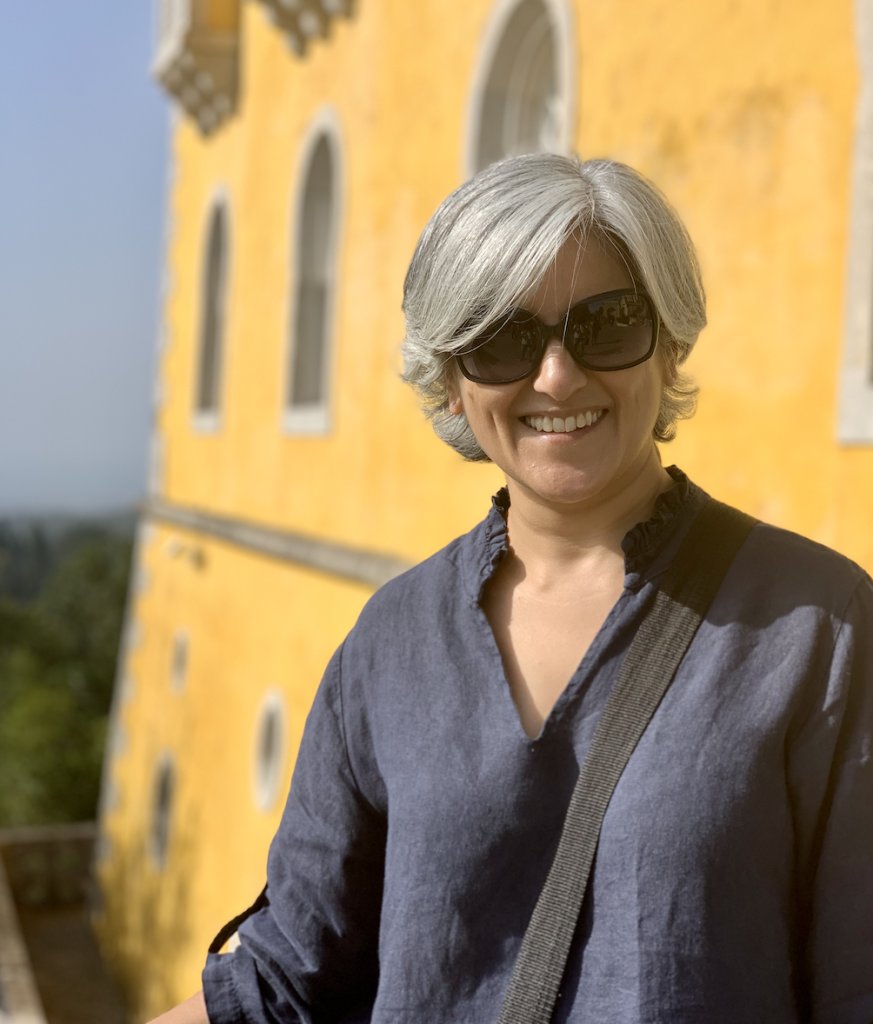
Recently, policy interns at Sahiyo have been interviewing members of the Connecticut (CT) Coalition to End FGM/C to learn more about its members and all the important work they contribute toward ending female genital mutilation/cutting (FGM/C). For the first two blogs, we interviewed Caitlin LeMay and Joanne Golden. In our third blog, Sahiyo’s policy intern, Juliet Shires, spoke to Zehra Patwa, Sahiyo U.S.’s Advisory Board Chair and co-founder of WeSpeakOut. When she was in her 40s, Patwa discovered that FGM/C was taking place in the Dawoodi Bohra community she belongs to. “I was shown an interview that my cousin had done for a TV documentary in Australia, talking about her experience of FGM/C in the Bohra community […] I thought ‘Oh, that’s terrible that she had to go through this.’ And at the end of the interview, she said that all the girls in her community had been cut and I could not even fathom that. The women [in my community] have always been highly intelligent, and progressive role models…so to hear that women in the community were doing this practice on young girls just blew me away. It took me a while to even accept that it was happening.” Then came another shock: Patwa learned that she had undergone FGM/C when she was just seven years old, but had no recollection of the event. She decided that she needed to do something to end the practice of FGM/C in her community and beyond. Her cousin invited her to join a WhatsApp group chat where she met the Sahiyo co-founders and Masooma Ranalvi, who would later co-found WeSpeakOut with Patwa. “I had to do something with this anger, with this shock, with all of these things I was feeling, and this lack of clarity that I had of what happened to me…I could not bear the thought that this was still happening to other girls. Part of the awfulness of this practice, for me, is that you don’t even give girls and women a chance, by cutting them…you risk so much pain, so much trauma.” A large part of her advocacy relates to her work with her own organization, WeSpeakOut, a partner of the CT Coalition and Sahiyo. WeSpeakOut is primarily focused on making FGM/C illegal in India, though it also works on other issues that impact women in the Bohra community. Their work involves research studies, petitions, and creating a legal framework for legislation banning the practice: “Because India is the seat of the Bohra community — that’s where the religious head is based — we figured if [FGM/C] was made illegal in India, then the Bohra diaspora all over the world would agree that the practice is illegal and would discontinue it. Sadly, passing a law in India involves many hurdles but we are seeing glimmers of social change in the community just by talking about this issue.” Patwa explains that speaking out has led to many conversations, many of which have highlighted how important education is in making meaningful changes against FGC: “When I started my activism in 2015, and started speaking out publicly in 2016 — which was terribly nerve-racking — so many people said to me, ‘Oh, I had no idea this happened here.’ I think people don’t realize how widespread this practice is. People want to know how many women and girls are cut…well, there’s no way of really knowing for sure, but it’s been estimated that there are more than 2,500 girls at risk in Connecticut alone, but the number is potentially much higher because it is such a clandestine practice. The states surrounding Connecticut have anti-FGM/C laws but Connecticut doesn’t, which makes our state a destination for cutting. [People I talk to often express surprise that] it’s a cultural practice, not a religious one.” She also emphasized the importance of empathy and understanding when creating legislation and advocating against the practice: “The parents who take their girls to be cut are not monsters…they’re being pressured into doing it because they’re told it’s the right thing to do by the trusted elders in their community. With education and the support of the law, parents can make an informed decision, backed by facts and others’ experiences, to protect their daughters.” Patwa expressed disappointment that a law has still not been passed in Connecticut, but remains hopeful: “It’s been disappointing that our bill has not made it into session three years in a row…it was a little disheartening at first but we are determined to continue working to pass this law because, even though we may not have huge numbers of girls at risk, we have some. And as far as I’m concerned, one girl cut is one too many. I know how much Connecticut cares about people and tries to do the right thing. I know in my heart that this law will be passed because it’s absolutely the right thing to do.” For people who would like to get involved in FGM/C activism, Patwa’s advice is simple: “Educate yourself, talk to people, reach out to people. Anybody at the Connecticut Coalition and at Sahiyo is very willing to help… And any organization that wants to become part of the coalition is welcome to lend their support: the more broad the coalition, the more helpful it will be to pass this law.” Patwa’s own experience with the Connecticut Coalition and the support it has received has strengthened her belief that FGM/C can end. “I truly appreciate all the allies who work to help survivors and prevent this practice. The Connecticut Coalition is now huge — there are many organizations involved. It’s heartening to have so many allies, who may not be from FGC-practicing communities, but who understand that there are so many different ways that they can help. It makes me tear up thinking about how much people care about others with different experiences from themselves. It gives me hope that we will see the end of this practice in my lifetime.” We would like to thank Zehra
Reflecting on the “Female Genital Mutilation/Cutting in California – Past, Present, and Future” Webinar
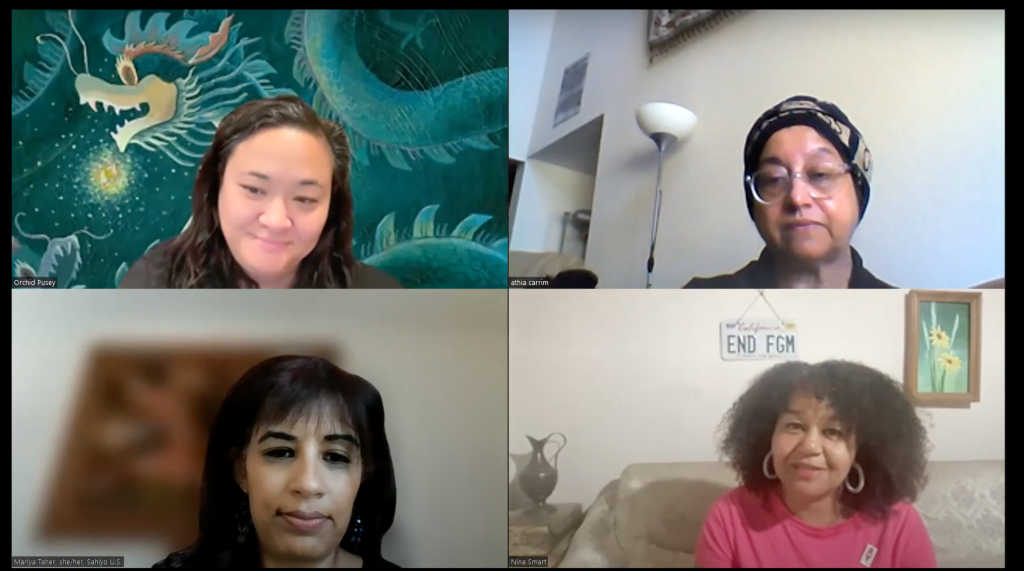
On October 11, Sahiyo in partnership with Equality Now, The U.S. End FGM/C Network, and the Greater Los Angeles FGM Taskforce held a joint webinar titled, “Female Genital Mutilation/Cutting in California – Past, Present, and Future.” The event was moderated by Sahiyo U.S. Executive Director, Mariya Taher and Shivagi Misra of Equality Now. The event brought together a panel of survivors, advocates, service providers, and community members who are already working on ending FGM/C in the state: Dr. Nina Smart and Athia Carrim of the Greater LA FGM Task Force, as well as Orchid Pusey of the San Francisco Asian Women’s Shelter. The speakers shared their histories of working in California, and in some cases globally, to raise awareness about the prevalence of FGC in the state. The conversation then turned to how the state could support advocates’ work by strengthening the current California FGC law, passed in 1996, to include components such as community education, cultural competence in care for survivors, and productive interactions with community members from practicing communities. As Shivangi Misra said during the event, “We can use the law for support, outreach, and healthcare.” The panel also highlighted the intersections of identities that survivors of FGC (for example, recognizing that an FGM/C survivor can also identify as gender-queer). This helps us recognize the need to push for a holistic approach to address survivors of FGM/C. The audience was very engaged, with many participants expressing their eagerness to dive deeper into the topic and sharing their personal experiences working with the issue in the state. We encourage you to watch the full webinar to hear more about the experiences of survivors and advocates, as well as learn what needs to be done while pushing for an updated law in California. [youtube url=”https://www.youtube.com/watch?v=HTAZ0vrd0cg”]
FGM/C in California – Past, Present, and Future

The California Coalition to End FGM/C is hosting a webinar titled, “FGM/C In California – Past, Present, and Future” Date: Friday, October 11th Time: 12:30 – 1:45 pm ET / 9:30 – 10:45 am PT Registration: https://bit.ly/CAcoalitionwebinar Zoom: https://us02web.zoom.us/j/89895243890?pwd=Y6iLxQmEV1OHv77XbSa8XbrSvbgvYa.1 Description: The webinar will be held like a town hall, giving participants the chance to learn in a safe space about the topic of female genital mutilation (FGM/C) through an interactive dialogue. Speakers will include Sahiyo U.S. Executive Director Mariya Taher; Shivangi Mirsa of Equality Now; Senait Admassu and Athia Carrim of the Greater LA FGM Task Force and African Coalition; and Orchid Pusey of the San Francisco Asian Women’s Shelter. Participants will discuss the shortcomings of the current law in California, which was written back in 1996. The coalition will also lay out how the legislation needs to be amended in order to create culturally sensitive and cognizant prevention and support programs to support survivors and those at risk of FGM/C. This Roundtable is an opportunity to share and learn from survivors, advocates, service providers, and community members on the topic of FGM/C and the work being done to address the issue. Furthermore, this event will seek to connect with California legislators who are accountable for upholding and addressing various components of the original 1996 FGM/C law. Through engaging narratives and open conversation, this webinar will help to garner support in building a greater California coalition to end FGM/C that can better advocate for strengthening existing laws on FGM/C in the State. Register for the webinar here. [youtube url=”https://www.youtube.com/watch?v=HTAZ0vrd0cg”]
Interview with Joanne Golden of the Connecticut Coalition to End FGM/C
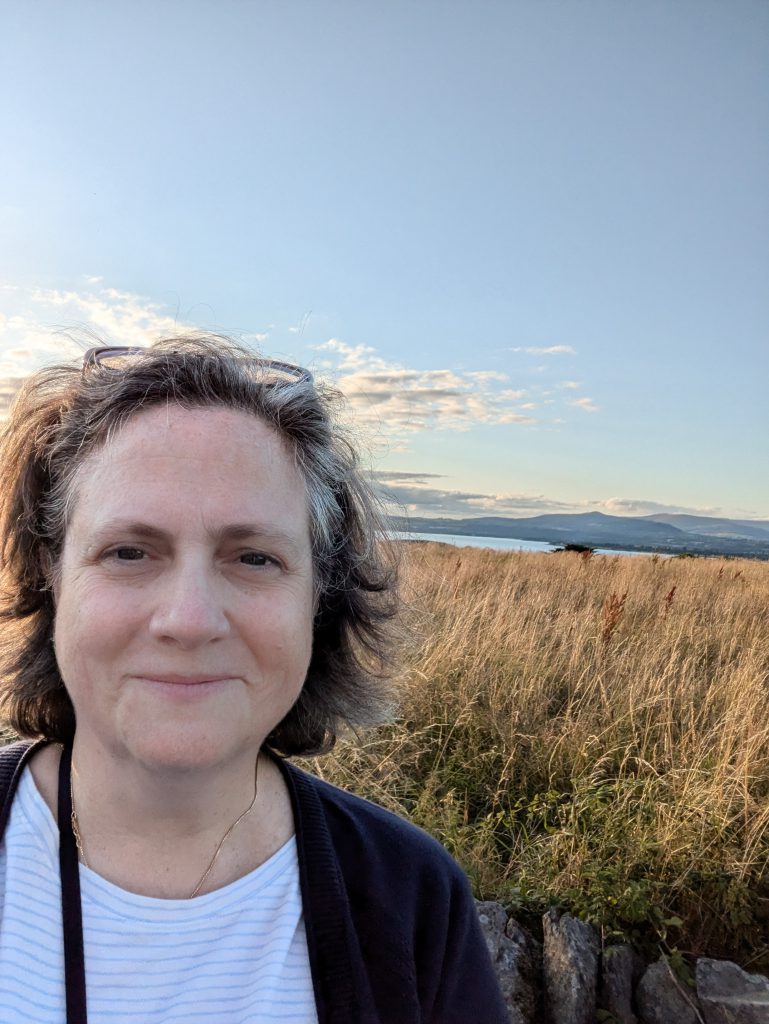
By Juliet Shires Recently, policy interns at Sahiyo have been interviewing members of the Connecticut (CT) Coalition to End FGM/C to learn more about coalition members’ important work toward policy creation on female genital cutting (FGC). In the first blog of the series, Sahiyo’s policy intern, Juliet Shires, interviewed the Executive Director of the U.S End FGM/C Network and CT Coalition member Caitlin LeMay. For this second blog, she talked to Joanne Golden, a member of the Sahiyo U.S. Advisory Board and an attorney working in Massachusetts. Juliet and Joanne discussed how listening to survivors and those from affected communities and her personal knowledge as a lawyer strengthens coalitions to more effectively pass holistic legislation. The Importance of the Lawyer-Survivor Partnership Joanne Golden’s journey as an activist working to prevent FGC started when she learned about the harmful practice and sought to pass legislation in Massachusetts to protect children from undergoing it, which eventually happened after seven years of advocacy efforts in August 2020. After being successful in Massachusetts, she began advising the CT Coalition to End FGM/C on how to do the same. She explains how meeting Mariya Taher, the Executive Director of Sahiyo U.S., and other survivors in 2015 changed her perspective on how to approach the issue of FGC as well as the understanding of her role as a lawyer within coalition work: “My mindset changed in that it wasn’t really about what I was doing [as a lawyer] but who we were doing it for.” Lawyers and lawmakers are needed to support the bill and get it passed through the legislative system as they bring the knowledge of how these systems work, but that work is meaningless without involving those communities and individuals impacted by FGC, the voices of survivors are needed to contribute to those laws, Joanne explained. “At the time a majority of people who [shared their stories] were at-risk were people of color, Muslim, and oftentimes immigrants. I fit none of those…My role wasn’t to put myself forward to ask all the questions. [It was to] let the survivors or to let people who could testify, [like doctors with medical/professional relationships to survivors,] take charge in those situations…It was saying how can I use my knowledge and my experience (as a woman and a lawyer) to protect the vulnerable. The question is how to apply that.” Joanne recognizes how in her role as a lawyer she must be especially culturally sensitive when approaching FGC given that it is often a deeply rooted practice in many different cultures. “I think first of all it’s important to have some humility and to understand that you do not know everything [as a lawyer]…you come at it from one aspect and say how can I use my knowledge and experience as a human and a woman [to help]? I know the law and how it’s meant to work, but the question is how to apply that.” Being humble also involves educating yourself, according to Joanne. It demonstrates your capacity to learn and listen to survivors of FGC to make the work you do more effective. On that note, Joanne contacted the Islamic Cultural Center in Boston and spoke to the Imam about what could be some ways to best approach FGC-impacted communities: “How can we get the message across that FGC is not necessary, not from a religious point of view, not from a legal point of view? And how to make people comfortable with the idea that they can abandon this practice for their benefit? Those are the tough conversations to have…once I was knowledgeable enough to make those arguments, I stepped forward and I thought I could be an advocate to help educate others.” Overall, Joanne stresses the importance of carefully crafting bills so that “people don’t get to use the law for their own agenda.” For example, the Massachusetts coalition reached out to GLAAD, an LGBTQ advocacy organization, to rephrase the bill on FGC so that it didn’t conflate gender-affirming surgery with FGC, and also make the former illegal. Joanne says lawyers provide the expertise and knowledge to ensure legislation is not written in a way that could bring about unintentional harmful consequences without people realizing it. Misconceptions Around FGM/C and the Law Since FGC is often connected with ideas of religion amongst some practicing communities, Joanne explains how some pro-FGC individuals believe that FGC should fall under the First Amendment as freedom of religion. “[People think that] the First Amendment protects religion. And it doesn’t protect religion, it protects your practice of your beliefs. It protects the individual. So, in understanding that [FGC is] not rooted in religion, it was a social practice and therefore we would not be denying someone’s ability to practice their religion or their faith…it has to do with more than religion…Really, what you’re talking about is a way to suppress a woman’s sexuality.” Joanne explains that to successfully pass state legislation on FGC, an American perception, one emphasizing the individual rather than the collective, can be helpful. “There’s a perception in the United States that we’re all about the individual and not about the family and not about society [which differs from other democracies across the world]. I think learning how to say that what you’re doing is preserving society by protecting the individual is important… [FGC can be seen as] a way to suppress a girl’s individuality.” Joanne also illustrates the importance of understanding the American political context in passing laws by explaining that because the US government is based on a federalist system, there is a great need for FGC legislation to be enacted in every state. Particularly since the 2018 Michigan Case ruled that FGC was a criminal activity on the state level and that Congress had overstepped its authority to pass such a law in the manner that it had. “Because the federal law existed since 1996, people thought that was enough…they forget federalism. There are areas of the law that are exclusive to the federal government
The Connecticut Coalition to End FGM/C Interview Series: Caitlin LeMay

By: Juliet Shires Policy interns at Sahiyo have been interviewing members of the Connecticut (CT) Coalition to End FGM/C to learn more about them and their important work. Recently, Sahiyo’s policy intern, Juliet Shires, talked to the Executive Director of the U.S End FGM/C Network and CT Coalition member, Caitlin LeMay, about her personal experiences as an advocate as well as the Network’s role in supporting the CT Coalition’s efforts. Misconceptions Around FGM/C Caitlin LeMay initially echoed the same belief that is found amongst many Americans, particularly those who identify as white, that FGC is only a practice that takes place in African, Asian countries, or basically anywhere but here. “I’m surprised I wasn’t more familiar with it earlier…I think that it really speaks to what it’s like being raised in the US and the misconceptions around how FGM/C is not seen as an issue here. I was susceptible to those same misconceptions and miseducation about FGM/C and its impact in the United States. I think because of that…it fuels me even more to spread awareness and spread education about FGM/C [in the US]…I’ve really found a home here and a lot of passion for this work.”. Caitlin continued to expand on these common misconceptions surrounding FGM/C, making it clear that it is very much a practice that affects the U.S. In fact, American doctors used to perform FGM/C to treat perceived ailments such as “lesbianism”, masturbation, and hysteria. She points out that the first step to ending this practice is recognizing that these problems exist within the U.S. “The United States has a long history, and present…of practicing FGM/C in our medical institutions as a regular practice. And we are yet to reconcile with that… [It was an] institutionalized practice to control women and their bodies and their behavior.” These racial stereotypes only serve to perpetuate problems in the U.S. “The root of the US not reconciling with [FGM/C]… is completely rooted in racism and anti-blackness. Not being able to see what is happening here as FGM/C is all rooted in racism, xenophobia, and anti-Blackness. We need to call it what it is… Education is our best tool [to combat this], it’s where we’ve made the best progress.” The Network’s Role in the Connecticut Coalition to End Female Genital Mutilation/Cutting In our interview, Caitlin also explained how the Network helps the CT Coalition, using their experiences working with other state-based coalitions to guide fellow organizations and volunteers in the CT Coalition. They also make sure to tailor their advice according to the state, keeping in mind that their communities have the most knowledge of what their state needs and how to achieve their goals. “They know who would be the best representatives or senators to reach out to sponsor the bill, to champion them … Engaging the local communities to take the lead on that and really engaging them because they know best.” Leading through locals goes hand and hand with allowing survivors to take the lead in determining what their needs are and what resources they need to address them. In other words, to determine what would be best “not just for Connecticut but for survivors in Connecticut.” It is a collaborative effort that involves debating and discussing with one another to create a solution that works for all survivors with varying backgrounds and experiences. Caitlin’s and the Network’s ultimate goal is to ensure that state coalitions are safe spaces, where survivors can feel heard and have the power to make change in their communities. “There’s a place for everybody. No matter what your comfort level or what your capacity is, there’s a place and there’s a way to get involved.” Caitlin and the Network assisted in the passage of Bill SSD 5453 in Washington, a piece of legislation aimed at ending the practice of FGM/C in the state. She highlights it as a prime example “of what can happen when there are these state coalitions that are survivor and community-led.” The bill achieved the coalition’s goal of fostering collaboration between state departments and community members who best address survivors’ needs. Now that Washington state has started implementing the bill, Caitlin hopes that Washington can become an example for other states passing new legislation around FGM/C: “We haven’t seen that before, so I think it’s such a great example and could really provide an example for other states. We really hope that other states see this and learn from it.” Throughout our conversation, Caitlin highlighted the importance of the progress in Washington state, and how it relates to the work that still needs to be done in Connecticut, and across the country. She also validates how disappointing and frustrating it can be when states like Connecticut don’t prioritize legislation around FGM/C but knows it’s also important to recognize that “we didn’t go backward, we just didn’t go forward.” Furthermore, it’s important to take a step back and look at the larger, global movement toward ending FGM/C and that’s something that can help encourage and provide us with hope. Still, she encourages anyone passionate about the issue of FGM/C to get involved in advocacy work as there’s work to be done all across the US – even in states that already have a law in place. “It’s all connected. Progress that is made in CT helps the movement in The Gambia. Progress made in The Gambia helps movements in Europe or Asia… Any glimmer of progress that we can find can help get us to tomorrow, and get to the next day, and keep us moving forward to that ultimate end goal of ending FGM/C globally.” We would like to thank Caitlin LeMay for taking the time to sit down with our policy intern and for her continued work with the CT Coalition and the U.S. End FGM/C Network. About The U.S. End FGM/C Network As a member of the Connecticut Coalition, the U.S. Network helps support the coalition’s efforts using the resources it possesses as a national organization.
Sahiyo U.S. Releases New Impact Report: Policy Outreach, Education, and Advocacy Program
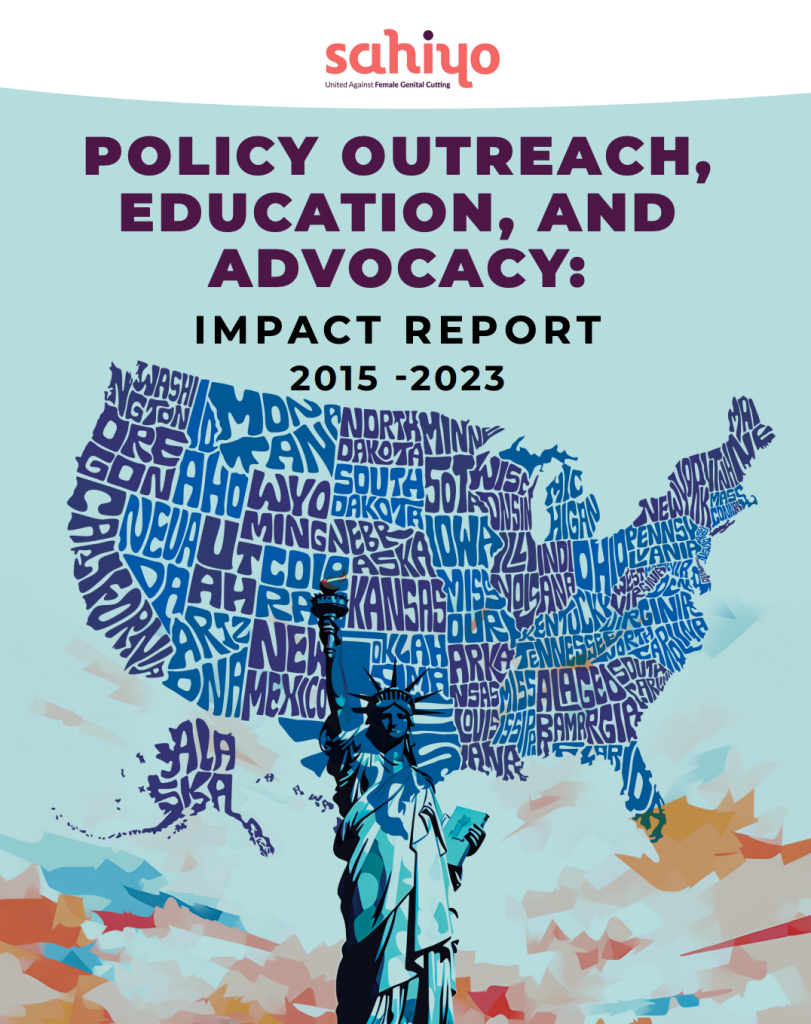
Policy work has been central to Sahiyo’s goal to end the practice of FGM/C and find ways to support survivors since our founding in 2015. Thus, Sahiyo U.S. is proud to publish, “Policy Outreach, Education, and Advocacy: Impact Report 2015-2023”, our newest report that reviews the work that Sahiyo U.S. has carried out and partnered with other organizations at the global, national, state, and local levels in geographies such as Massachusetts, Connecticut, Washington, Michigan, and New York City. Take a look at some of the highlights: Why We Engage in Policy Work: We recognize that to end FGC and support survivors, policies must be informed by and created in partnership with communities impacted by FGC. FGC is considered a social norm in practicing communities, and laws against FGC may help to prevent the practice by acting as a mechanism to shape the behavior of communities or individuals. Policies can be educational tools, deterrents, and influencers for psychosocial change. In guiding the creation of laws, communities can begin to realize that harmful practices – even those perceived to be steeped in culture and/or religion – should not be perpetuated. Furthermore, research indicates that to achieve maximum impact, policies should be developed holistically. This involves integrating community education and outreach components, alongside civil remedies for survivors, rather than relying solely on criminalization which does not fully address the larger goal of ending the practice. Policy Program Goals: Here are Sahiyo’s goals for our advocacy work: Educate frontline professionals (i.e. healthcare providers, social workers, childcare professionals, etc…), lawmakers, and constituents while also engaging them to support policies addressing FGC. Unite diverse stakeholders and establish shared concerns and connections related to FGC, fostering a collective impact and the creation of state-level coalitions dedicated to advocating for policy changes that address FGC. Uplift and include the voices of survivors in educating policymakers. Increase individual civic engagement in the legislative process and ensure that impacted communities have a voice in the creation of policies in order to prevent FGM/C and support survivors. By the Numbers: Program Impact from 2016-2023 3 state coalitions were formed. 2 states passed new legislation on FGC. 1 website was created for the Connecticut Coalition to End FGM/C. 2 Facebook pages were created for the Washington Coalition & Connecticut Coalition. 58 educational meetings held with legislators. 19 educational outreach webinars related to policy were hosted. 42 policy-related blog posts were posted on Sahiyo’s website. 2 action alerts created in partnership with UNICEF USA & Equality Now. To learn more, read the full report here.
Intern Spotlight: Policy Intern Sara Khattak

Sara is currently pursuing her bachelor’s degree at George Mason University in Chinese and Global Affairs and minoring in American Sign Language. On campus, she is an active member of the community as a Certified Personal Trainer and Executive Officer for the Fencing Club. Off campus, she enjoys staying home to read, play video games, and journal. Sara hopes to aspire to leverage her skills and interests to bridge communication gaps between diverse communities. Joining Sahiyo is part of that mission to understand cultural differences and end FGC. When and how did you first get involved with Sahiyo? I first found out about Sahiyo when I was researching FGC for a social justice philanthropy class last fall. I gathered information about the practice of FGC, who it affects, and what nonprofits were addressing the issues. I then gave a presentation to my class on the topic. While looking at Sahiyo’s website, I saw that internships were available and mentally bookmarked it for later. I applied to be an intern at Sahiyo this past spring, and then began my work with Sahiyo in July 2024. What does your work with Sahiyo involve? As a policy intern, I attend state coalition meetings, interview coalition members, and write various blogs about FGM/C and coalition work. The state coalitions have been created to work collaboratively on strengthening and advocating for policy solutions regarding FGM/C. I’ve attended meetings for the Washington, Connecticut, Hawaii, and DC, Maryland, Virginia (DMV) coalitions to End FGM/C. Each coalition is at a different progress stage, so I’m gaining a well-rounded view of the advocacy and implementation process they are pursuing. I’m also writing blogs about how to get involved with anti-FGC activism and the history of FGC in the U.S. Additionally, I’m holding interviews with coalition members to better understand their perspective within this movement and the work they have done to pass legislation. The Hawaii and DMV coalitions to End FGM/C are still in the beginning stages of building their programs, so I’m doing preliminary research on lawmakers and statistics for them in addition to providing other forms of support. How has your involvement with Sahiyo impacted your life? This is my first time working in a policy role and I have already learned so much about advocacy, writing, and communication. With a little experience and knowledge, I feel more confident in speaking out about FGC and educating my family and friends on the topic. Raising awareness is the first step for change, and it’s not as hard to get involved as people think! FGC was important for me to speak about because it’s not well-known despite its presence in the U.S. I wanted my peers to become more aware of it. What words of wisdom would you like to share with others who may be interested in supporting Sahiyo and the movement against FGC? Just join! Sahiyo has a ton of volunteers and opportunities for anyone to make an impact. Everyone who is against FGC should get involved, every bit of involvement counts, and sometimes the smallest actions can lead to unexpected and meaningful change. The effect of collective action cannot be understated.
Volunteer Spotlight: Policy Intern Juliet Shires
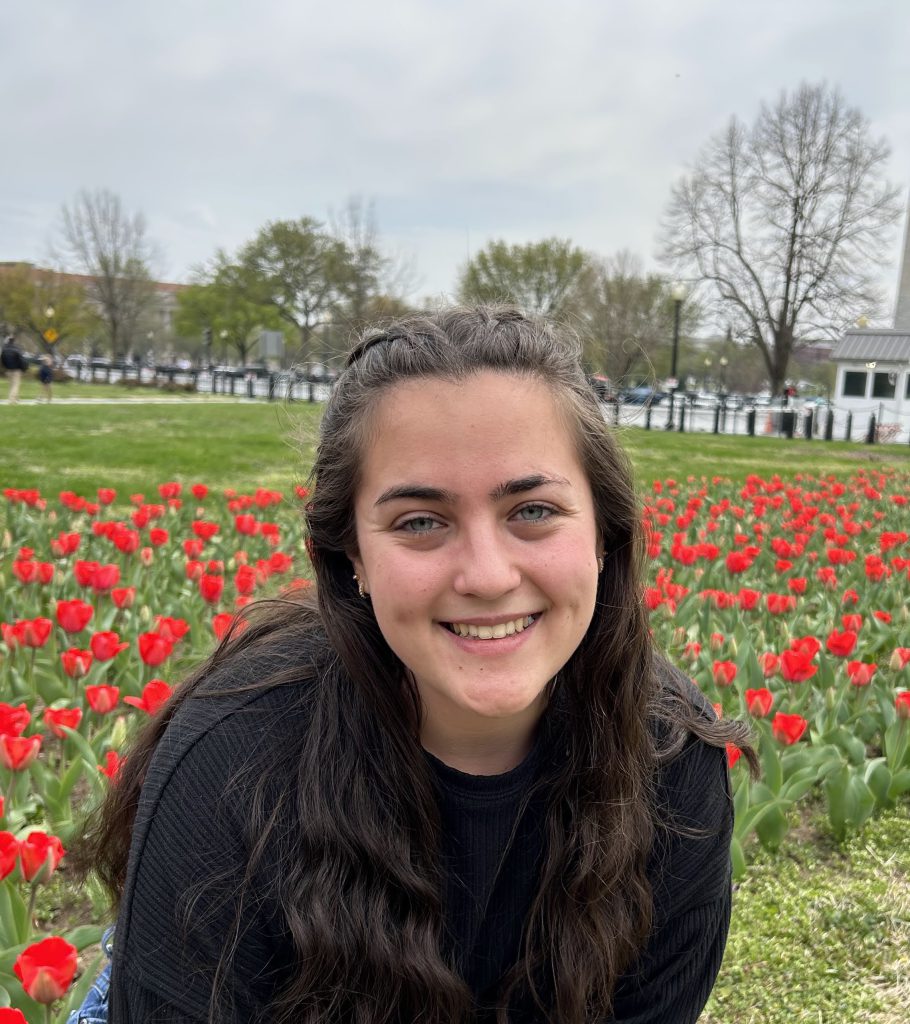
Juliet Shires is a rising junior at San Diego State University studying English with minors in Political Science and French. She is passionate about making meaningful policy changes accompanied by comprehensive educational programming. Juliet is excited to be working with Sahiyo to join the fight against gender-based violence, bringing marginalized voices to the forefront. When and how did you first get involved with Sahiyo? I began my time at Sahiyo as a policy intern at the end of March 2024. I found Sahiyo because I was looking for internships where I could get involved with policy work. I wasn’t searching for advocacy around a particular issue but when I found Sahiyo and looked more into their work, I knew it was something I wanted to be involved in. What does your work with Sahiyo involve? My day-to-day work with Sahiyo can take many different forms. Most of it revolves around Sahiyo’s advocacy work with several state coalitions to pass or improve laws around FGC. This can take the form of attending meetings and interviewing coalition members in order to write blog posts highlighting the work that the coalition is doing. Most recently I have been planning the “CA Coalition – FGM/C in California – Past, Present, and Future” webinar. The aim of which is to grow the policy work we are doing in California. This webinar should take place in early August. In the Washington coalition, I have aided in the implementation phase of Senate Bill 5453, which was passed last year, helping fill out plans going into next year and researching how other states have implemented their own FGC laws. How has your involvement with Sahiyo impacted your life? I have learned so much already in my time with Sahiyo. From the importance of listening to survivors, to realizing just how many people and communities are impacted by FGC. Furthermore, Sahiyo has shown me how much I enjoy working on single-issue policy. What this means is that my work at Sahiyo revolves around FGC, allowing me to focus on helping to support policy that revolves around a specific issue, which leads to policies that are better attuned to addressing FGC. What words of wisdom would you like to share with others who may be interested in supporting Sahiyo and the movement against FGC? Just get involved in any way you can, and in whatever way you have the capacity to do so. The most intimidating step is always the first, so I think it’s important to just jump right in with advocacy, and take the time to learn about the issue. Related: Volunteer Spotlight: Programs Intern Sophia Jones Staff Spotlight Community Engagement Coordinator: Samman Masud A conversation with Washington activist Absa Samba: SB 5453 a product of collaboration and persistence Washington State becomes 41st state to pass law against FGM/C
Building Support for the Connecticut Coalition to End FGM/C After Failure in 2024 Legislative Session

By Juliet Shires In the 2024 legislative session, the Connecticut Judiciary Committee failed to raise a bill that would protect children from female genital mutilation/cutting (FGM/C). Rep. Jilian Gilchrest (D) would have sponsored the bill to create educational and outreach programs, issue civil remedies for survivors, and make FGM/C a clear criminal offense in the state. This marks the need for renewed efforts to build a stronger coalition to address this issue in legislation. Zehra Patwa, a survivor of FGM/C, U.S Advisory Board member for Sahiyo, and CT resident outlines the disappointment many feel at the negligence of not raising this bill despite widespread support: “I’m extremely disappointed that, despite strong support from both sides of the aisle, the bill to protect girls was not raised this session. Protecting the bodily integrity of girls could not be more important especially as we know, anecdotally, that the practice of FGM/C thrives in secret. This bill would have protected girls from the practice but also would have cared for those who have undergone this practice. Not having this bill pushed through puts girls and women in danger and tells them “You are not important”. That is unacceptable in my opinion.” The Connecticut Coalition to End FGM/C was formed in 2020 by individuals who were concerned about Connecticut being only one of nine states without legislation banning the practice of FGM/C. One such Connecticut resident included Jo Keogh, a psychotherapist who worked with organizations such as Sahiyo and the U.S. End FGM/C Network to form the original Coalition: “About 95% of what I know now about FGM/C, I didn’t know at the beginning [of the coalition]. I just knew I didn’t want it to happen in my state,” says Keogh. Furthermore, there was fear that Connecticut could become a “safe haven” for people seeking to perform FGM/C from neighboring states in which FGM/C is illegal. The CT Coalition aims to bring an end to the practice of FGM/C in the state by advocating for a holistic bill that includes educational outreach and input from the community, including those impacted by the FGM/C, such as survivors. One way the Coalition has garnered support for a bill is through a Change.org to ban FGM/C which has received over 80,000 signatures since its start in 2018. The recent failure in the Connecticut legislature has shown the continued need for the Coalition’s continued work. Over 2,600 girls are at risk of undergoing FGM/C in Connecticut, despite it being globally considered a human rights violation. We need to urge the legislature to prioritize the passage of legislation surrounding FGM/C by calling on your representatives in Connecticut to take action in the next legislative session. Want to get involved? Visit https://endfgmcinct.com/ for more information or contact the CT Coalition Volunteer with Sahiyo Sign the petition
Our Fight to End FGM in The Gambia: Who is Listening?
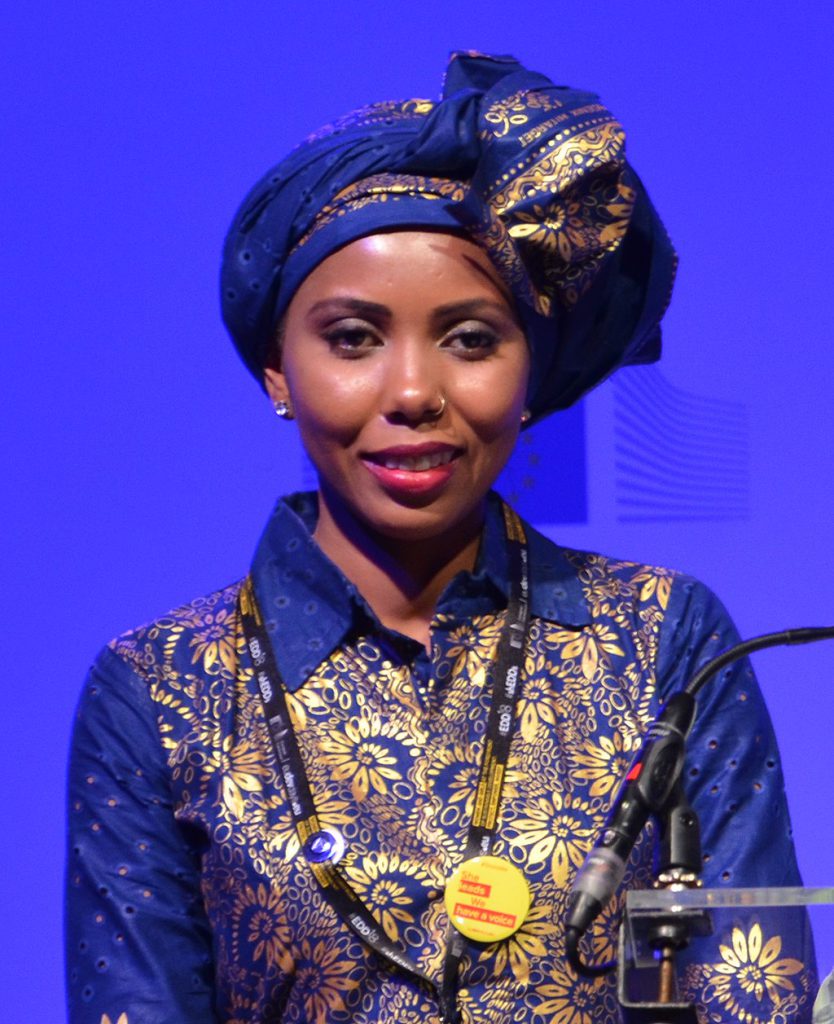
By: Jaha Dukureh, a Gambian anti-female genital mutilation campaigner and the founder and executive director of Safe Hands for Girls. Jaha was named TIME Magazine’s 100 Most Influential People for 2016 and was nominated for the Nobel Peace Prize in 2018. After I spent years campaigning to outlaw female circumcision, finally my country started to listen. In 2015, The Gambia banned Female Genital Mutilation (FGM) and imposed penalties on those who perform or practice it. As a survivor of FGM who played an instrumental role in this fight, I felt ecstatic when I heard the news. But it was a joy that wasn’t to last. If certain politicians have their way, the law will soon disappear and more young children will have to suffer the same pain I did. Some, like my half-sister, may lose their lives. As a survivor of FGM born and raised in The Gambia, a Serahule, and a proud Muslim, my journey has been one of pain, resilience, and unwavering determination. I have learned that it is important to recognize my roots and the challenges that come from speaking up, especially if you are a woman and of my background. Today, as I reflect on the challenges that lie ahead, I am compelled to raise my voice in defense of the progress that has been made in protecting our daughters, our sisters, and future generations of women and girls. I speak up for myself, for my generation, and for the millions of girls who will hear our story and say enough is enough. I will never perform this practice on my daughter. That statement, in itself, is the ultimate victory. And yet sadly, there are still many parents in The Gambia who are fighting for this practice to live on, ignoring our cries for it to end. Still, we refuse to be silenced and stand idly by as our daughters’ bodies are mutilated, their futures stolen, and their dreams shattered. That’s why, as the world celebrated women’s achievements during Women’s History Month in March, we launched a petition to stop the repeal of the ban on FGM in The Gambia. But to be effective – to actually be heard – we need all of you to help tell our parents, “Enough is enough.” Our campaign has given voices to many young girls who continue to unapologetically lead movements to help change social norms. But today, we also need to be honest with ourselves. As much as I am emotionally invested in the campaign, I have always recognized my limitations, especially when I decided to bring my campaign home. If you have the chance to watch Jaha’s Promise, you will understand what I am trying to explain. I was returning home to join a decades-long campaign to end this harmful practice, but it wasn’t easy. As young people, we developed a whole society approach to eradicating the practice. This required us to organize but also to engage with those who had different views than us. Those Gambians for whom FGM is considered a sacred passage that women have to go through. Those fathers, like mine, who gave consent to the practice without understanding what we go through. Like in many parts of Africa, FGM remains a deeply entrenched tradition in The Gambia, affecting a significant portion of the population. According to the United Nations Population Fund, 75 percent of women and girls aged 15-49 have undergone some form of FGM. This practice cuts across ethnic, religious, and cultural boundaries, affecting various communities nationwide. If lawmakers overturn the law now, the numbers will only increase. The proposed repeal is not just a legal issue; it is a moral imperative, a test of our humanity, and a reflection of our values as a society. It sends a dangerous message that the rights and dignity of girls are expendable, that their bodies are mere vessels for the preservation of harmful traditions. But we know better. We know that FGM is a violation of human rights, a form of violence against women and girls, and a practice that should end with us. That’s why we are mobilizing, organizing, and uniting to raise the alarm for the rights of all girls to live free from fear and harm. Our petition is more than just signatures on a page; it is a collective call to our parents to listen to the voice of reason and understand the harm that we go through. As a survivor, I know firsthand the pain and trauma inflicted by FGM. But I also know the power of resilience, the strength of solidarity, and the hope that springs from the darkest of places. Join me – join all of us survivors – as we raise our voices, protect our girls, and say no to the repeal of the ban on FGM in The Gambia. Sign our petition, raise awareness, and stand in solidarity with survivors of FGM. Together, we can protect our girls and build a world where every woman and girl is empowered to live a life of dignity, freedom, and equality. We owe it to our daughters, our sisters, and ourselves to mobilize our communities and demand accountability from our leaders. Our parents aren’t listening to us — our politicians aren’t listening to us — which is why we need your voice, too. With your help, our collective voices will be so loud they’ll be impossible to ignore. #StopFGMRepealGambia #ProtectOurGirls #EndFGM Jaha Dukureh, Founder & CEO of Safe Hands for Girls Council member Nalafem Collective The Gambia Related links: Behind the Wall by Gambian activist and FGC survivor Isatou Jallow UNICEF released new data on global prevalence of FGM/C
